Stevia is a natural non-caloric sweetener that’s an increasingly popular alternative to artificial sweeteners and table sugar.
Stevia is an extract of the Stevia rebaudiana plant, which is native to South America. Stevia produces a well-balanced sweet taste with no bitter or chemical aftertaste, unlike other non caloric sweeteners.
Thanks to the surge of emerging scientific evidence suggesting that excessive sugar consumption is bad for your health, many people are turning to stevia for sweetness in their foods and drinks.
Our research team has reviewed and ranked the ten best sources of stevia for adding sweetness but not sugar to your diet.
Research
Rankings
1. SweetLeaf Sweet Drops
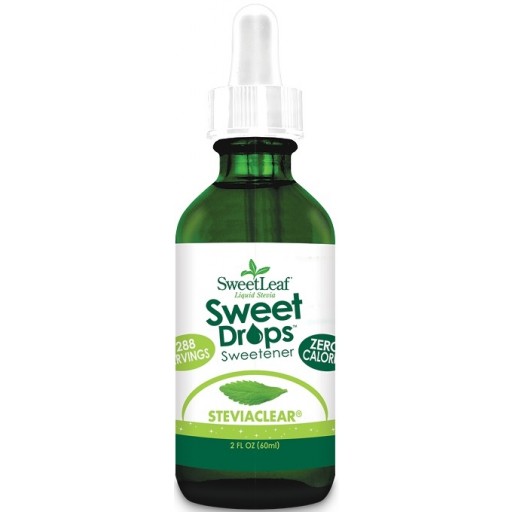
SweetLeaf Sweet Drops is specifically made for sweetening tea and coffee. The stevia is already dissolved in water, which is great for iced tea and cold brew coffee, which can make it difficult to coax solid powder into dissolving.
SweetLeaf Sweet Drops also have a small amount of natural flavorings that give the solution a somewhat sweeter and more well-balanced flavor profile.
While you’re not going to bake with it, this is still undoubtedly the top choice for most other users.
2. MicroIngredients Stevia
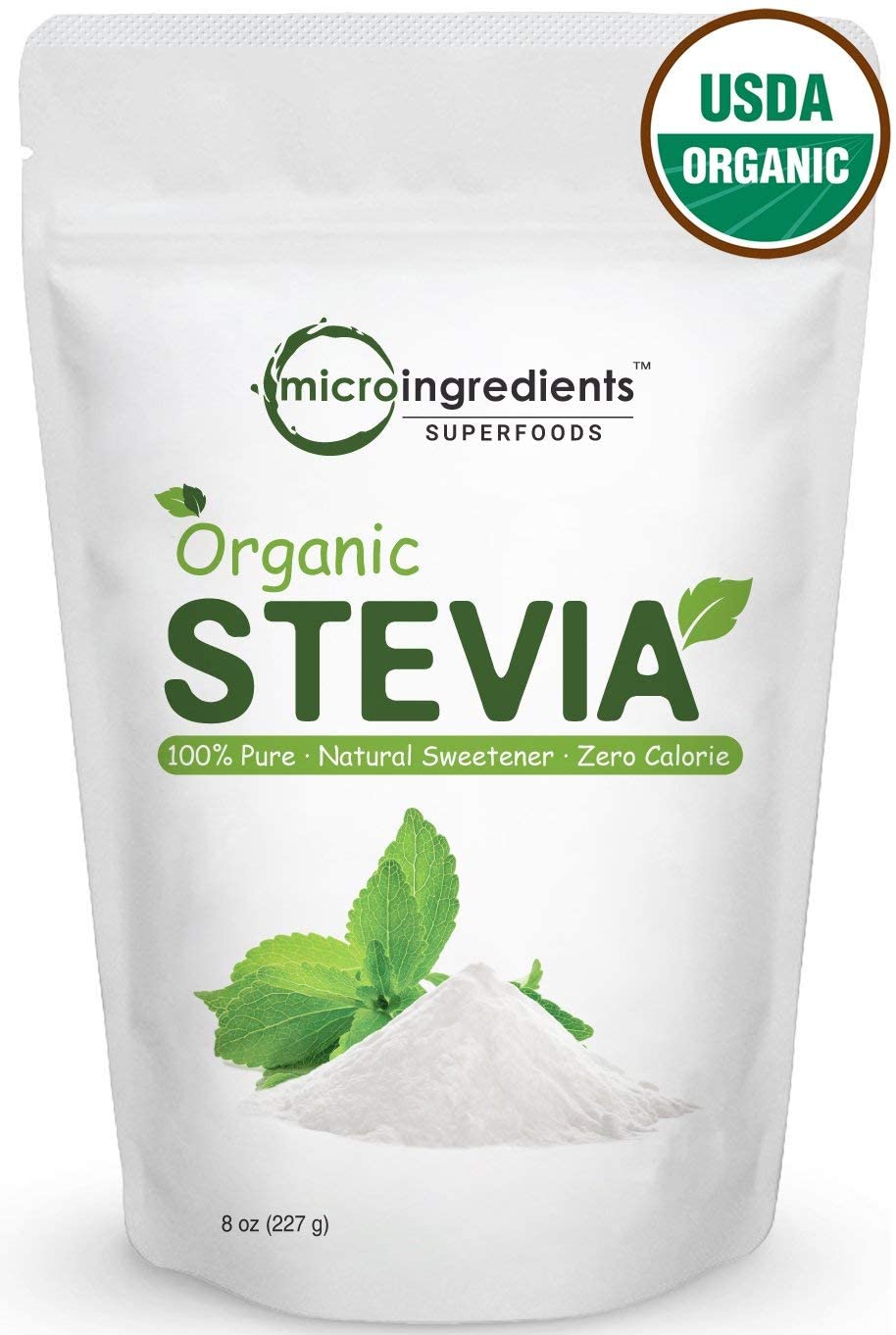
If you want a high quality stevia extract that comes in powder form, MicroIngredients Stevia is the perfect choice. These eight ounce tubs contain plenty of stevia to keep you well-stocked for weeks.
On top of that, the stevia leaves used to make this stevia extract are organically certified, making it a great option for those who value purity.
3. NOW Better Stevia
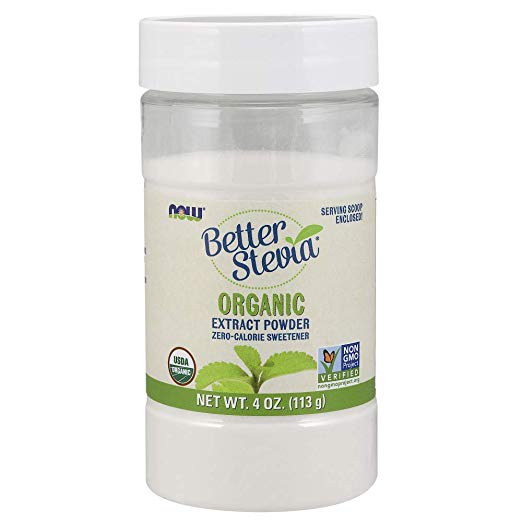
NOW Better Stevia is an organic stevia extract that comes in a plastic tub that makes scooping out stevia powder easy.
It’s 100% pure, and thanks to its organic certification, you can be sure it’s free of synthetic pesticides and herbicides. For occasional users, this four-ounce container is perfect.
4. CCnature Organic Stevia Powder
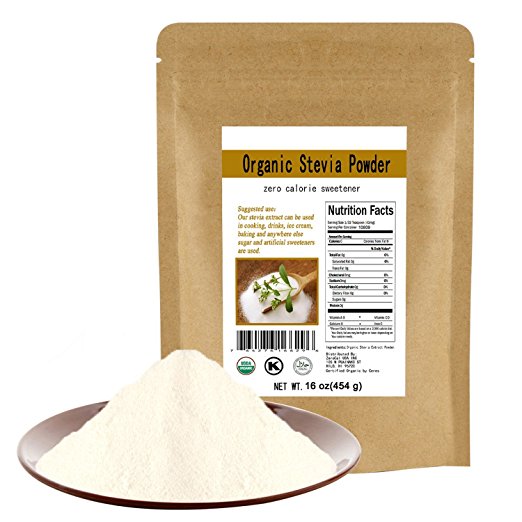
CCnature Organic Stevia Powder comes in bulk bags of up to 16 ounces each. If you are using stevia for baking and cooking, or if you just want to stock up, it’s a great option.
CCnature Organic Stevia Powder is 100% pure and organically certified, so its quality is top-notch.
5. Natural Mate Stevia
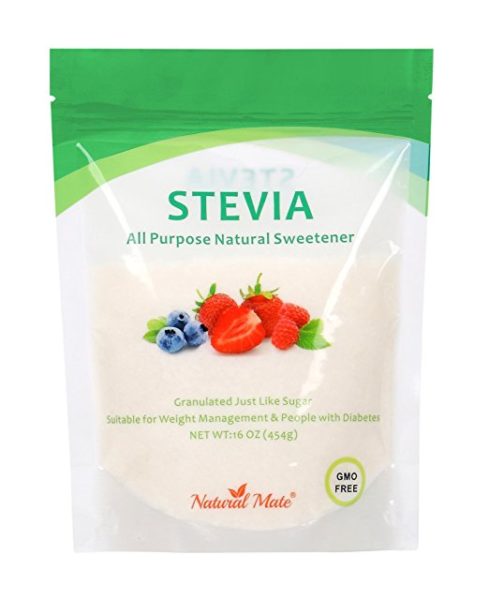
Natural Mate Stevia is a good bulk option if all you want is pure stevia. The one pound resealable bags are well-suited for baking and cooking, where you need a large amount of powdered stevia on-hand.
If you use stevia for sweetening drinks, you’ll probably want a smaller container unless your household goes through a lot on a regular basis.
6. Truvia Naturally Sweet
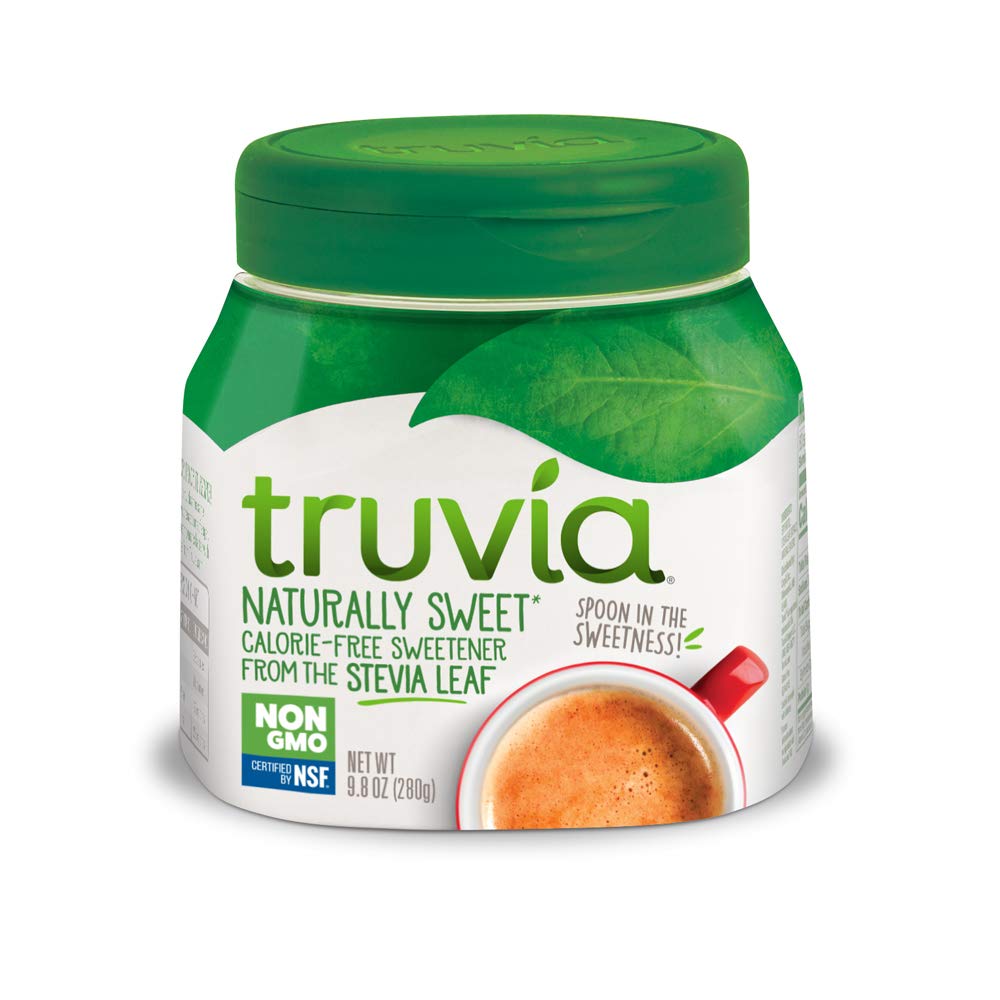
Truvia Naturally Sweet uses a mixture of stevia, erythritol, and natural flavors to create a balanced and smooth sweetener that avoids the chemical aftertaste that some people taste when using other non caloric sweeteners.
If you are looking for a pure and simple stevia sweetener, though, Truvia Naturally Sweet isn’t the best option.
7. Stevia Select Sweetener
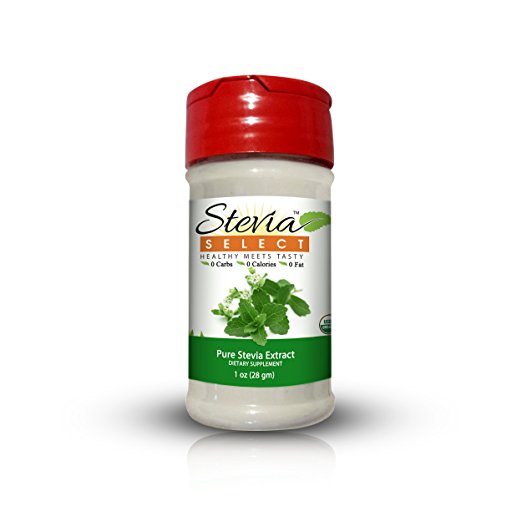
Stevia Select Sweetener is an organic stevia extract that comes in a tiny one ounce container.
If you use stevia on a regular basis, you’ll probably want to opt for a larger container, but it’s a good option for occasional users, or people who need a travel-sized container for sweetening drinks without sugar while on the go.
8. Mommy Knows Best Pure Stevia
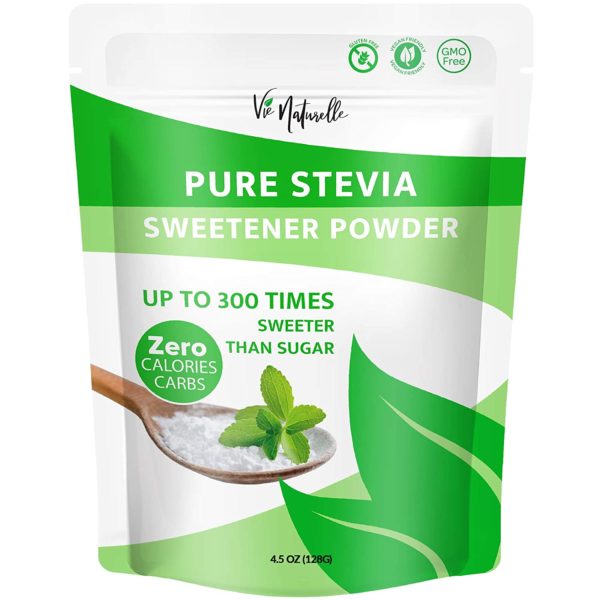
Mommy Knows Best Pure Stevia comes in a three ounce tub that’s well-suited for sweetening tea and coffee, but isn’t quite large enough for baking and cooking.
It’s got a sweet and well-balanced taste, but the only drawback for some people will be the lack of an organic certification.
9. Stevia in the Raw
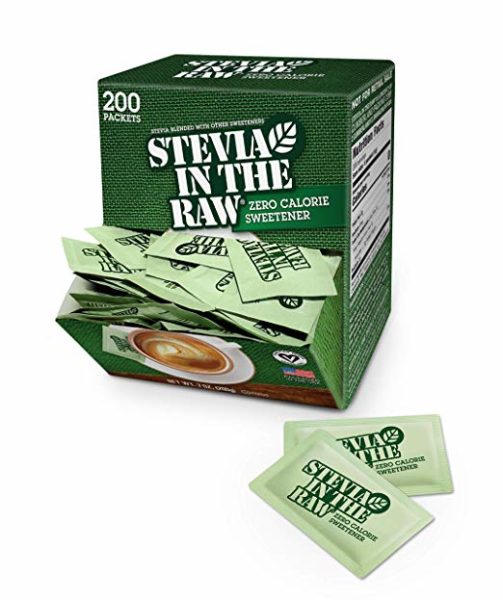
Stevia in the Raw is popular and well-liked, but it is not the most pure stevia extract on the market.
It uses a combination of maltodextrin and stevia extract, which means the powder is somewhat less sweet and more blandly flavored than a pure stevia.
10. KAL Sure Stevia
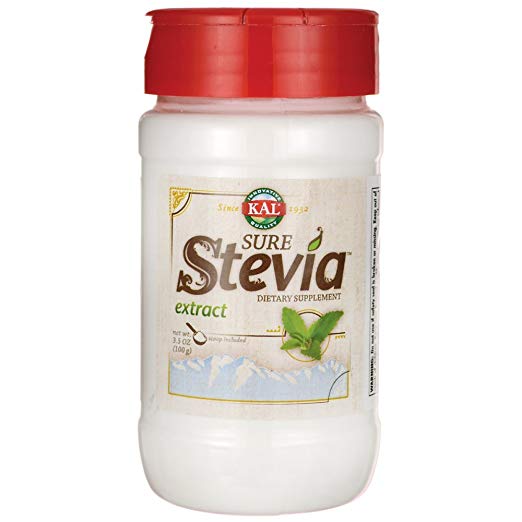
For a long time KAL Sure Stevia was on top of the market with its sweet, 100% pure stevia extract. Now, however, they’ve mixed their stevia with maltodextrin, much to the chagrin of former KAL enthusiasts.
Add to that the fact that it is not organically certified like many of the other competitors, and KAL Sure Stevia winds up at the bottom of the rankings despite its historic popularity.
Category winners
Best stevia overall: SweetLeaf Sweet Drops Liquid Stevia
For taste, purity, and convenience, SweetLeaf is a great all-around pick. Whether you’re adding it to coffee and tea or just want a bit of sweetness in a protein shake, it’s a fantastic choice and our top overall recommendation.
Best stevia for baking: MicroIngredients Organic Stevia
The 100% pure formulation of MicroIngredients Organic Stevia makes it perfect for baking and cooking. You can substitute it at a ratio of 1:8 for sugar in your recipes to maintain the same sweetness, but with zero added carbs.
Best stevia for weight loss: MicroIngredients Organic Stevia
Trying to drop weight, but have a sweet tooth? Instead of falling back into your old habits of using sugar as a sweetener, try MicroIngredients Organic Stevia instead. This powder-form stevia can be substituted anywhere you’d typically use sugar, and adds zero calories.
Best stevia for coffee and tea: SweetLeaf Sweet Drops Liquid Stevia
Swapping out sugar for stevia when sweetening coffee and tea is easy with SweetLeaf. You don’t need to stir up your drink for several minutes, and the simple, pure formulation means there’s no bitter or astringent aftertaste.
Best stevia for the keto diet: NOW Better Stevia
Stevia is a fantastic sweetener for keto dieters, because it’s calorie-free and won’t upset your body’s state of ketosis, even if you consume it on a regular basis. For this purpose, we love NOW Better Stevia thanks to its clean formulation and easy-to-use plastic tub.
Best liquid stevia: SweetLeaf Sweet Drops Liquid Stevia
For fast, easy use, nothing beats the convenience of SweetLeaf. Add a few drops to your shake, smoothie, or hot beverage and move on—no need to worry about granules not dissolving and sludge, grit, or residue.
Who Should Buy Stevia
Stevia is safe for all individuals and is exceptional at blood sugar control – making it ideal for diabetics. It is also great for people looking to lose or maintain weight, who don’t want to give up their favorite sweet foods.
Stevia can be consumed by both pregnant women and children but should be done under the supervision of a doctor.
How We Ranked
The first thing we looked at, when formulating our rankings, was aded ingredients. Both Kal Sure Stevia and Stevia in the Raw made the bottom of our lists for including maltodextrin in their stevia products. Maltodextrin can spike blood sugar, which can be dangerous for diabetics who are seeking out stevia. Mommy Knows Best Pure Stevia ranked higher for providing a pure product but doesn’t include an organic certification, which is why it didn’t rank any higher than 8th.
Truvia Naturally Sweet combines stevia and erythritol for a better taste product. However, we preferred a more pure product, which is why it ranked where it did. CCnature Stevia Powder is great for baking. It’s 100% pure and organically certified, which is why it ranked in our top 5.
Next, we looked for organic certification. NOW Stevia provides pure organically certified stevia extract, that’s free of synthetic pesticides and herbicides. It comes in the perfect 4-ounce size as well, making it ideal for adding to coffee or for baking. Kiva Organic Stevia uses only organically certified USA stevia leaves to make its extract, making it one of the purest and trustworthy products on the market. For this, it took second place.
Lastly, we look at convenience and versatility. SweetLeaf Sweet Drops took the top spot for providing the perfect beverage sweetener made from high-quality stevia. It comes already dissolved in water, making it perfect for both hot and cold beverages. It also includes natural flavors to provide a more balanced taste. Although it can’t be used for baking, its high quality and versatility makes it one of the best available.
Benefits
Stevia contains compounds that can help reduce blood pressure. One study focused on blood pressure measurements for 174 Chinese patients who were taking a stevia-derived supplement. A double-blind, randomized trial with placebo controls was conducted over a 2-year period, and participants took 500 milligrams of stevioside three times daily. (1) Over the course of the trial, researchers measured the blood pressure of both the patients in the stevia group and the patients in the placebo group.
Researchers believe the stevioside may act like a class of drugs for lowering blood pressure called calcium channel blockers, which affect cell membrane function. (2)
Average drops for systolic measurements clocked in at 10 points (from 150 mmHg to 140 mmHg), while diastolic readings went down 6 points (from 95 mmHg to 89 mmHg). With the length of the study, these results may indicate good possibilities for using steviocide as a natural remedy for the condition.
Hypertension (high blood pressure) is a reliable marker for increased risk of developing heart disease, which is the leading cause of death worldwide. (3)
The group taking stevioside in this study reported improved quality of life, and also lowered their risk of developing left ventricular hypertrophy, which is an enlargement of the heart that can result from hypertension.
Compounds in stevia may also help with cholesterol levels. A different study in animals was conducted using the same compounds from stevia. This study found that stevia decreased the amount of oxidized LDL cholesterol (also known as “bad cholesterol”) in the blood; if it affects humans in a similar manner, stevia could open another avenue for dropping heart disease risk factors. (4)
The sweet compounds from stevia plants also performed well in studies with patients being treated for type 2 diabetes. In this clinical trial, the control group took a gram of maize starch (placebo) with meals, while the other group took a gram of stevioside. Blood sugar levels dropped by 18% in the stevioside group compared to the group that took the maize starch placebo. (5)
Lab experiments with test tubes and animals indicate steviocide may also stimulate insulin production, which is the hormone that drives blood sugar into the cells for use as fuel. (6, 7)
Other animal studies suggest stevia may have anti-inflammatory properties; there may also be benefits in protecting against cancer and modulating the immune system. (8)
Since the results from animal studies aren’t always a good predictor for how humans will react in the same circumstances, further research will bring more information to light.
When stevia’s effects on test subjects’ blood sugar after eating a meal was compared with table sugar (sucrose) and aspartame, results noted lower blood sugar levels and insulin readings with stevia. (91)
Two recent comprehensive reviews of stevia studies indicate no ill health effects have surfaced. (10, 11) While animal studies using massive amounts of stevia led researchers to believe fertility could be affected, the circumstances aren’t likely to be duplicated in human experience. (12, 13, 14)
Side effects
As noted above, in terms of health side effects, stevia is not known to cause any adverse health effects. Some people do find that stevia has a bitter aftertaste that they do not care for, though some stevia products use natural flavors or a combination of stevia and erythritol to balance out the aftertaste.
As more stevia products are developed, taste has become less of an issue, but the most common way manufacturers address the problem won’t suit everyone.
Stevia extract is often combined with other substances, including maltodextrin, which is a highly processed starch derived from potatoes, corn or rice. In this application, its non-clumping qualities are valued, since it can be difficult to achieve even distribution of those tiny, super-charged granules of dried stevia. (15)
Another additive used in stevia sweeteners is inulin. This is an innocuous plant fiber that helps in the dissolving process and may be preferable to maltodextrin.
Fructooligosaccharides (FOS) are also used as an additive to stevia sweetener products. This insoluble plant fiber is known for its positive impact on friendly digestive bacteria, and may add more benefits to your choice. (16)
Stevia is sometimes combined with other sweeteners, which can also mute the bitterness. One popular brand contains stevia and xylitol, a sweetener with about half the calories of sucrose (sugar).
Since stevia doesn’t have the bulk of sucrose, substituting in recipes can be challenging, but there are now products containing stevia made especially for baking. This adjustment makes it more likely the end-product will be reasonably comparable to the original recipe calling for sugar.
If you have concerns about how stevia products are processed, research the brand you enjoy. Water extraction, along with crystallization and purification, is the most common processing method for making the leap from a green leaf to a white powder. (17)
Liquid stevia is technically a tincture made from plant leaves, so it may be more acceptable to some; it’s often suspended and preserved in alcohol, but water-based tinctures are also available. (18)
Read labels for products containing stevia so you’ll know exactly what you’re buying.
FAQ
Why was stevia banned? Though stevia is legal now, it was banned for a period of time in the 1990s because it was unjustly correlated with the development of cancer. After being banned for three years, the Dietary Supplement Health and Education Act of 1994 reversed the initial ban from 1991. Since the ban was lifted, there have been numerous studies showing that there is no evidence that stevia leads to cancer.
Does stevia harm your organs? There has been some speculations that stevia may negatively affect your kidneys, but it is unconfirmed by science.
What are the compounds that make stevia sweet? There are several commands that provide the sweetness of stevia, including rebaudioside A and stevioside. They are both up to 300x sweeter than sugar.
Is stevia healthy? Stevia is considered a relatively healthy sweetener for a variety of reasons. For starters, it provides a similar sweetness to sugar without the calories. It is also all-natural, making it safe to use in a variety of special diets. In terms of the glycemic index, stevia has a glycemic index of 0, which is the lowest value a food item can receive (19).
In a study conducted in 2010, researchers analyzed the effects of sugar substitutes on diet, satiety, and even insulin levels. Researchers found that stevia reduced overall food intake and lowered insulin levels – making it an attractive option for people seeking weight loss, as well as diabetics (20).
Does stevia cause digestive issues? Generally speaking, stevia is considered a safe sugar substitute with relatively few negative side effects. However, it can cause digestive issues such as nausea, flatulence, and cramping. It can also cause allergies in certain patients and lower blood pressure. If you have pre-existing medical conditions, you could also consult your doctor prior to adding stevia to your diet.
Is stevia better for you than sugar? Stevia is a better option than sugar if you’re looking to sweeten your food and beverages. Sugar has a high glycemic index score of 63, which results in significant blood sugar spikes. Stevia, on the other hand, has a score of 0, making no impact on blood sugar or insulin levels after consumption (21).
Sugar also contains 4 calories per gram and is a major contributor to obesity. Stevia contains virtually zero calories. Stevia has also been shown to improve satiety as well, especially when compared to sugar.
Is stevia better for you than other artificial sweeteners? Stevia is considered a natural sweetener and tends to be much healthier than artificial sweeteners. This is because stevia is all-natural and contains no chemicals or artificial ingredients. Furthermore, most artificial sweeteners are not zero-calorie and usually cause a slight spike in blood sugar – which can be a problem for certain special populations.
Does stevia have calories? Stevia is a natural sweetener with no calories, documented health benefits, and a long history of medicinal use in South America, where the plant originates. It’s a popular alternative to artificial sweeteners among people who care about the health effects of ingredients like sugar alcohols. This is good news, because nearly a quarter of American adults and about half that many children used sugar substitutes regularly in 2012. (22)
Why is stevia so much better than sugar? The dark side of refined white sugar has been common knowledge for years. As more research conclusions roll in about the way sugar consumption contributes to poor health and the development of chronic disease, the popularity of alternative sweeteners continues to grow. Stevia comes from a green plant with leaves containing two different compounds, steviocide and rebaudioside A, which are a hundred times as sweet as sugar.
Can you grow stevia yourself? It’s possible to grow stevia yourself, and the leaves will contain approximately 10% steviocide. You could dry these, crush them, and mix them with an herbal tea product, for example. It might be tricky to get the right amount to suit your sweet tooth, but it would be effective. The products you’ll find on the market are usually powders or liquids refined from the compounds occurring naturally in stevia leaves. These are obviously designed for convenient use, and have established a loyal following over the past few years. Stevia may be the only existing calorie-free sweetener that actually has benefits.
Is stevia safe for dogs? Stevia is safe for dogs in moderation, and it is often used in dog products. However, when consumed in large quantities, stevia can cause digestive side effects – similar to humans. Other natural sugar substitutes are not safe for dogs. For example, xylitol has been connected to shutting down a dog’s organs and leading to death.
Why is stevia white? Stevia comes in two colors: white and green. White stevia is the most common and the sweetest part of the stevia plant. Green stevia includes the entire stevia leaf and is considered less sweet. If you’re looking for a sweet sugar substitute to add to your food or beverages, white stevia is the best option. If you’re more interested in the nutritional content of the sugar substitute, green stevia would likely be better.
Is stevia expensive? Most stevia products are rather inexpensive and are available at many health food stores as well as online. Organic stevia tends to be more expensive, but if you consume a lot of it, it’s worth the price.
What are some of the best ways to use stevia? Stevia can be used in almost every way that sugar can. You can add it to your foods, beverages, and recipes in which you would normally add sugar too.
What is stevia? Stevia is a wildly popular sugar substitute that comes directly from the stevia plant. The stevia plant, native to countries like Brazil, is known for its sweet taste. Stevia leaves are processed to produce the powder-like substance, known as stevia, that can be used in place of sugar in food and beverages. After its brief three year ban in the early 1990s, stevia has steadily become one of the most popular and healthy sugar substitutes on the market. Unlike most sugar substitutes, stevia provides zero calories and zero impact on blood sugar – making stevia the perfect alternative sweetener that can also help improve your health.
Can stevia lower blood pressure? Yes, stevia can lower blood pressure in persons with elevated blood pressure by up to 14% (23). People who have normal blood pressure won’t see an effect from stevia.
What are the differences between sugar and stevia? Stevia and sugar are very similar in two areas: taste and origin. They are both all-natural and provide sweetness to whatever they are added to. Other than that, these two ingredients are light-years away from each other. On average, sugar contains about 4 calories per serving and has a glycemic index of about 63. It will lead to a significant increase in blood glucose levels shortly after consumption.
Stevia comes directly from the leaves of the stevia plant and has 0 calories per gram. It also has a glycemic index of zero, which means it won’t spike blood sugar on its own.
Can stevia benefit your arteries? Yes, stevia can benefit your arteries by reducing plaque build-up. A 2010 study looked at how Stevioside could decrease plaque build up and improve cholesterol profiles in obese mice. Researchers found that mice who were administered the Stevioside treatment were associated with lower levels of atherosclerotic plaque development due to improved insulin signaling and antioxidant defense (24).
Will stevia cause weight gain? Stevia can’t cause weight gain by itself since it has zero calories. In fact, stevia is well known to help people lose weight by reducing appetite. In at least one study, scientists determined that stevia consumption reduces appetite and improves satiety. Stevia can also help reduce overall caloric intake when substituted for sugar.
Can stevia prevent cancer? There has been some research showing that stevia compounds like Stevioside can be toxic to cancerous cells, making them ideal to preventing cancer (25).
More research is needed though to confirm these findings.
Is stevia safe for diabetics? Stevia is one of the better sugar substitutes for those with diabetes or issues with blood sugar control. The glycemic index is a scale used to determine how similar a food product or additive is to actual glucose, with glucose being at the top of the scale. Since glucose intake triggers an intense blood sugar level response, diabetics should consume products that are lower on the glycemic index to help control their blood sugar levels. Stevia has a glycemic index of zero, while table sugar has a glycemic index of 63, making it an incredible sugar substitute for diabetics.
Can stevia improve cholesterol? Yes, stevia can improve good cholesterol and lower bad cholesterol. In a month long 2009 study, subjects consumed 20ml of stevia extract daily. Researchers found stevia increased the good HDL cholesterol and lowered total cholesterol, LDL bad cholesterol It also lowered triglycerides (26).
Is stevia keto-friendly? Stevia is one of the best sugar substitutes when it comes to the keto diet because it does not impact blood sugar levels and has roughly one gram of carbohydrates per serving.
Does stevia negatively affect your gut flora? A 2019 study showed stevia might negatively affect gut flora, by negatively affecting the healthy bacteria (27).
Is stevia cancerous? There is no science to support the idea that stevia is correlated with cancer. In 1991, stevia was banned because there was a concern that it contained substances and chemicals that could cause cancer. After a three year ban, major health organizations determined that there was no legitimate concern about cancer development after using stevia. Since then, several other studies have been conducted and have yet to prove a definitive link between stevia consumption and cancer.
Is stevia safe to consume during pregnancy? Stevia extract has been shown to be safe to consume during pregnancy. However, the less processed whole-leaf stevia, is not safe for pregnant women and should be avoided.
What are the best ways to consume stevia? Stevia can be consumed in a variety of ways including in beverages, in yogurt and in baked goods.
Is stevia an artificial sweetener? Stevia is not an artificial sweetener, but rather a natural sweetener. Artificial sweeteners are chemical-based sweeteners designed to mimic the effects of sugar without producing negative side effects. Conversely, natural sweeteners like stevia and xylitol, come from natural sources. Stevia comes directly from the stevia plant and does not contain artificial ingredients on its own. However, lower-quality stevia products can contain artificial ingredients, so it’s important to check the label before buying.
What does stevia taste like? Stevia has been said to provide a moderate licorice-like aftertaste. It is also 300x sweeter than sugar, so a little bit goes a long way.
Is stevia safe for children? Stevia is safe for children. However, because they are much smaller humans, they can consume the upper limit quite quickly – making it important to actively monitor their consumption. Kids should not have more than 4mg per kg of bodyweight.
Is stevia approved by the FDA? Only some stevia products, like Steviol glycosides Reb A, are approved by the FDA. Whole-leaf stevia and crude stevia are not, and should be used with caution.
Related Articles
Recap
Stevia is an all-natural sugar substitute that has no documented side effects. It’s great news for people with a sweet tooth who are trying to cut down on their sugar consumption. In addition, the stevia plant contains compounds that have been associated with a number of health benefits, like lower blood pressure and LDL cholesterol. If you’re looking for an alternative to white sugar, stevia is one of the best bets you’ll find in today’s health food marketplace.
For BodyNutrition’s #1 stevia recommendation, click here.